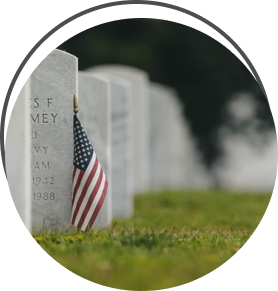Veterans' Resources
We are happy to help you plan a veteran's funeral or memorial service in Inglewood and the surrounding Los Angeles County.

Veterans Funeral Services
There are a variety of options available for honoring veterans who pass away. A Military Funeral Honors (MFH) ceremony is the standard service available for all eligible veterans. The ceremony involves the folding and presentation of the United States flag to the family of the veteran and playing of Taps. There will be at least two members of the military present, including at least one representative from the branch of the Armed Forces in which the deceased veteran served. The deceased veteran’s status may determine the level of honors rendered, ranging from the standard MFH, a 7 Person Detail, or Full Military Honors. The playing of Taps may be recorded or played by a live bugler if one is available at the time of the service. The family may also request to have the military representatives serve as pallbearers if desired.
Who is eligible for Military Funeral Honors?
- Active duty military members or those in the Selected Reserve.
- Former members of the military who served on active duty, provided they were not dishonorably discharged at the end of their service.
- Former military members who finished a minimum of one enlistment term or period of initial obligated service in the Selected Reserves and were not dishonorably discharged.
- Former military members who were discharged from the Selected Reserves because of a disability resulting from or aggravated by serving in the line of duty.
Who is not eligible for Military Funeral Honors?
- Anyone separating from the military under dishonorable conditions or who is ineligible for veteran’s benefits due to their character of service.
- A person who was ordered to report to an induction station but was never inducted into military service.
- Anyone discharged from the Selected Reserve before completing one term of enlistment or period of initial obligated service due to a reason aside from a disability resulting from or aggravated by the line of duty.
- Any person convicted of a Federal or State capital crime and sentenced to death or life imprisonment.
How do I establish veteran eligibility?
Generally the DD Form 214, the Certificate of Release or Discharge from Active Duty, is required to establish a veteran’s eligibility for military funeral honors. If you do not have the DD Form 214 you can apply for one online here or by filling out the Standard Form 180. If you are unable to get the DD Form 214, you may provide copies of any discharge documents that show the veteran was discharged under any conditions other than dishonorably.
Is anyone else eligible to receive funeral honors?
Members of the Commissioned Officer Corps of the Public Health Service (PHS) and the National Oceanic and Atmospheric Administration (NOAA) are eligible to receive funeral honors, as well as members of a Uniformed Service. More information about NOAA eligibility can be obtained from the Officer Personnel Management Division (OPMD) via this website. Funeral honors eligibility for PHS personnel is determined with the PHS Form 1867, Statement of Service. If you need additional assistance or do not have a copy of the PHS Form 1867, you may contact the Privacy Coordinator for the Commissioned Corps at (240) 453-6041.

Veterans Headstones
A Government headstone or grave marker is provided by the Department of Veterans Affairs (VA) at no charge for an unmarked grave of any deceased eligible veteran at any cemetery around the world, regardless of when they died. A headstone or marker can also be provided by the VA for eligible veterans who died on or after November 1, 1990 even if there is already a private headstone or marker in place. When applying for a headstone or marker, the applicant will be able to select the type of headstone they would like based on the options available at that time. Generally flat markers are available in granite, marble or bronze and upright headstones can be made of granite or marble. The design is required to be consistent with any existing monuments at the cemetery or place of burial. There are also niche markers to recognize cremated remains placed in a columbarium.
If the deceased veteran was buried in a national cemetery, state veteran’s cemetery, or in a military base or post cemetery, the cemetery officials will be responsible for ordering any markers or headstones based on the details provided by the next of kin or authorized representative of the veteran. The VA does not provide a headstone or marker for spouses or children of the veteran unless they are also buried in a national cemetery, state veteran’s cemetery, or in a military base or post cemetery.
While the headstone or marker is provided by the VA free of cost, there may be a charge incurred for placing the marker in a private cemetery. Any setting fees or cemetery expenses are the responsibility of the applicant and not paid by the VA.
Veterans Burial Flags
The VA will provide a United States flag at no cost to the family of any eligible deceased veteran. The flag is intended to drape the casket or accompany the urn during any funeral or memorial service. Frequently the family will keep the flag as a symbol of the veteran’s service to their country. There are flag holders designed to display the folded flag after the services are done as a keepsake for the family.
The following veterans are eligible to receive a burial flag:
- Any veteran serving during wartime.
- A veteran who died on active duty after May 27, 1941
- Any veteran who died while on active duty after May 27, 1941.
- Any veteran serving after January 31, 1955.
- A veteran who served during peacetime and was discharged or released from service before June 27, 1950.
- Those serving in the organized military forces of the Commonwealth of the Philippines while in service of the U.S. Armed forces and who died on or after April 25, 1951.
- Eligible former members of the Selected Reserves.
More information about burial flags can be found on the VA website here.

Who Is Eligible to Receive the Burial Flag?
The flag is usually given to the next of kin to be retained as a keepsake after the funeral service. A request form needs to be completed and if there is not next of kin, the flag will be provided to the individual making the request. For veterans buried in national cemeteries, some families choose to donate their burial flag to the Avenue of Flags program which flies flags on patriotic holidays in honor of the deceased veterans.
How Can You Apply?
Your funeral director can help you complete the necessary application for a flag request. The form is also available on the VA website at the link provided above.
Can a Burial Flag Be Replaced?
The VA is only able to provide one flag per veteran’s funeral under the terms of the law, and is not authorized to replace any lost, destroyed or stolen flags. There are some community and veteran’s organizations who may be able to help you obtain a replacement flag should something happen to the original one you receive.
How Should the Burial Flag Be Displayed?
There is protocol in place for displaying the flag depending on whether the casket is open or closed. The VA provides information about the correct way to display and fold the flag on the application form you will need to complete in order to receive the flag. Burial flags are made of cotton and not suitable for being displayed outside. You should choose a protected location inside to keep it safe.
National Cemetery
Certain veterans, service members and selected family members may be eligible to be buried in a national cemetery if they meet the requirements. There is a wide range of eligibility criteria so you should check the VA website to see if your loved one is potentially eligible for this benefit. More information can be found on the VA website here.
